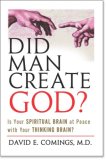Summary

It will never be possible to prove whether God exists or not. The questions “Did Man Create God?” or, “Is the Theory of God a man-made theory?” are fundamentally different from the question “Does God Exist?” It is perfectly possible that the answer to the question, “Did Man Create God” is “Yes,” and yet a God, different than the one man made, still exists. [p612].
[This book reviews the evidence for the proposal that man created the uniquely personal God of the major religions. The prior chapters of the book addressing this point are reviewed in Part VIII Summary. This will not be abstracted since that has been done in the previous excerpts. The following excepts cover an area not covered in the previous chapters]
Is the Rational Brain Incompatible with Religion and Faith?
A major theme of this book is not only whether man’s rational brain and spiritual brain can coexist in harmony but also whether man’s rational brain and religion and faith can coexist in harmony. The answer depends upon the religion and the faith. Belief systems relating to God can be divided into essentially four different levels of compatibility with the rational brain: 1. maximally compatible, 2. compatible with minor qualifications, 3. compatible with major qualifications, 4. incompatible.
1. Maximally compatible. These belief systems include atheism, agnosticism, non-theism, secular humanism, Buddhism, and Jainism (a form of spirituality that does not believe in a creator God but seeks to have a friendly, non-violent relationship with all living beings.) [p621]
2. Compatible with minor qualifications. I would place in this category any religion that does not believe in the inerrancy of the Bible, the Qur’an or any other sacred text, either because they understand that these texts simply provide metaphors for a moral and spiritual life, or because they understand that these texts were written by man not by God. I would also include those who believe that religion is a living entity that needs to adapt to modern life and not be frozen into rigid beliefs of two thousand years ago, who believe in the inclusion of members even if they have doubts about some aspects of the faith, and who believe in the inclusion of women and individuals of all sexual orientation. These belief systems would include Unitarian/Universalist, Reform Judaism, and Taoism, Taoists seek to harmonize the fundamental energies of the universe consisting of the cosmic currents of yin and yang to attain immortality. They de-emphasize material gain and emphasize a close connection between the mind, body and the environment. I have placed Taoism in the category of compatible with minor modifications since the rational brain has some difficulty with the concept of immortality. [p622]
3. Compatible with major qualifications. This group includes all religions that do not insist on the inerrancy of the Bible but do believe in a personal God that responds to one’s prayers. Members may or may not believe in heaven, hell, and miracles. One could reasonably ask, “How could I possibly believe that the rational brain would be comfortable with this set of beliefs?” Basically, I do not, which is why I placed it in the group of “Compatible with major qualifications.” Those qualifications are that the rational brain is capable of understanding that not all people in the world are comfortable with a purely rational approach to life and that there is also a spiritual brain with its own set of needs and with its ability to bypass the rational brain and to make up its own mind about the total needs of the individual. That is the major qualification that allows the rational brain to live in some degree of peace with its more emotionally needy spiritual partner.
4. Incompatible. I would place all religions that believe in the inerrancy of the sacred texts in this category. This would include all fundamentalist faiths whether Christian, Jewish, Islamic or other. I would especially include all faiths that believe in any form of the apocalypse, whether pre- or post-millennial, and that believe theirs and theirs alone is the true religion. While the appeal to the spiritual brain may be great, the appeal to the rational brain is zero, even when the rational brain understands the needs of the spiritual brain. In these cases the rational brain would be saying, “enough is enough.” No level of qualification should allow the rational brain to be comfortable with these faiths. These are the faiths that have been responsible for most of the religious wars, intolerance, hatred, and terrorism. The elimination of the belief in the literal truth of the sacred texts and the concept that one religion is superior to another would be of enormous benefit.
Hopefully, the majority of humans will have come to understand that man was the author of the Theory of God and will have adopted one of the first three of the above options for satisfying both their rational and spiritual brain and that the ultimate – a rational spirituality – will be the glue that holds mankind together to grow in peace.
